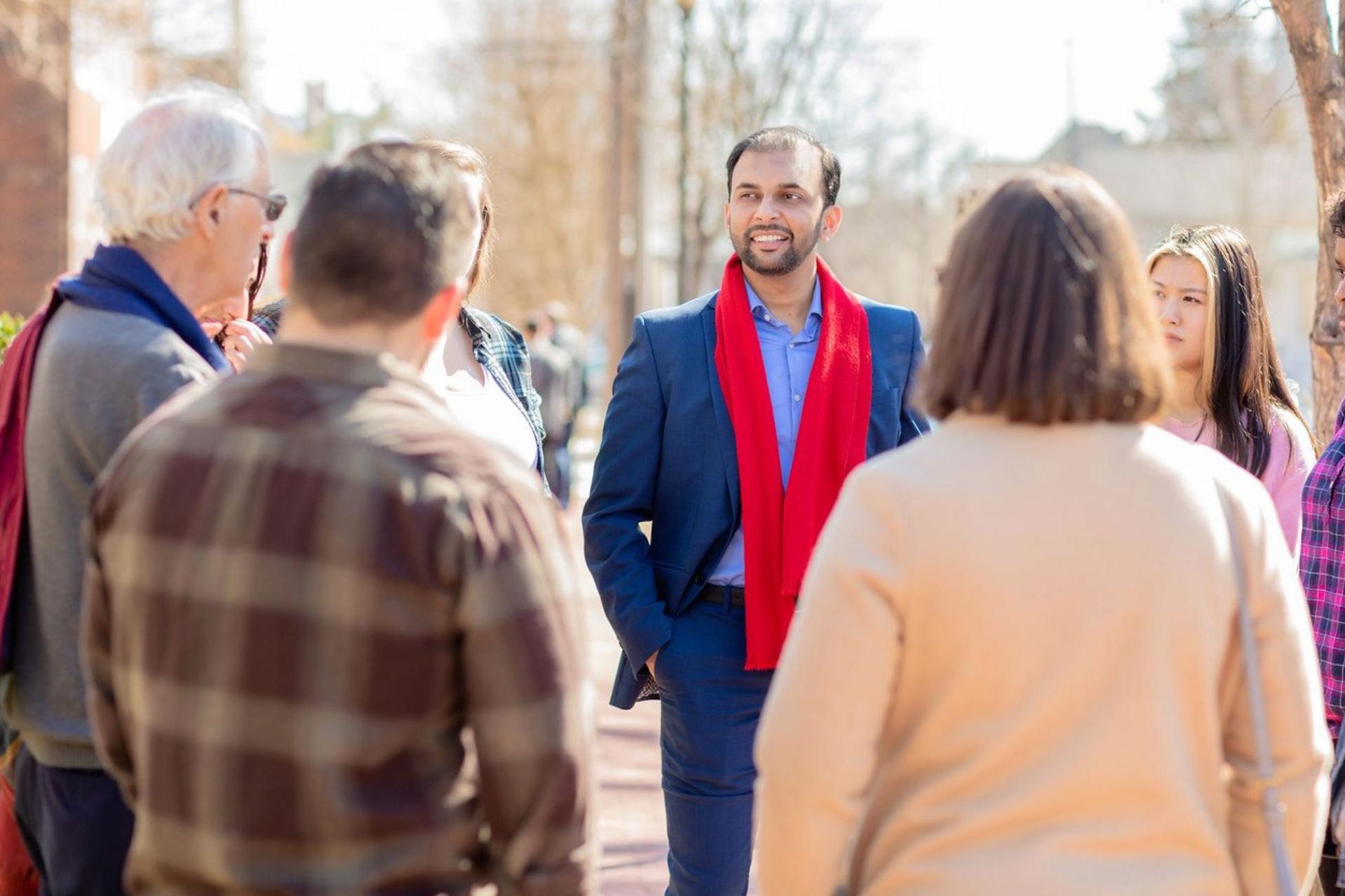This Muslim American congressional candidate sees hateful messages as a chance for dialogue
By his own admission, Oz Dillon hated Muslims.
“I was very prejudiced against Islam,” he said. After 9/11, Dillon said he watched the kind of news that trained him to see all Muslims as extremists. “I would see somebody with a hijab and mutter to myself or to them, you know, ‘What a disgrace they are.’”
In early March, when Dillon saw a Muslim American man running to represent Virginia in Congress, it made him mad. He tweeted that the candidate, Qasim Rashid, was unfit for office, and included a hateful meme that falsely portrayed Islam as promoting violence.
“It’s abhorrent, what I did,” he said.
But what he did is common. Many Muslim American candidates for elected office get hateful messages. It can be scary. But Qasim Rashid, the candidate Dillon attacked, almost seems to welcome them.
“I see them as opportunities. And that can sound a little bit calloused, I know.”
“I see them as opportunities. And that can sound a little bit calloused, I know,” Qasim Rashid said.
Qasim Rashid has reason to be callous. In Pakistan, where he was born, his Ahmadiyya Muslim community is persecuted. He’s had family members die there as a result of violence against them. Qasim Rashid grew up in Washington, DC, and Chicago, and became an activist and human rights lawyer. Last year, a North Carolina man was convicted of threatening to lynch him.
Running for Congress has made Qasim Rashid more of a target. Still, he said he has a policy of engaging with people who send him hateful messages.
“I think the bigger risk is for me to stay silent and not try to neutralize this hatred,” Qasim Rashid said. “Because if I do that, as my children get older, they’ll have to suffer through it.”
Qasim Rashid and his wife, Ayesha Rashid, have three young children. Ayesha Rashid said he’s always been fearless. She’s the one who worries.
“I’m not going to sugarcoat it. I do have anxiety sometimes. One day, I woke up really anxious because I had a nightmare about his public profile as a Muslim.”
“I’m not going to sugarcoat it. I do have anxiety sometimes,” she said. “One day, I woke up really anxious because I had a nightmare about his public profile as a Muslim.”
But she supports him.
When he saw Dillon’s hateful tweet, Qasim Rashid’s first instinct was to do what he’s gotten accustomed to doing — responding with links to educational articles that dispel falsehoods.
“But then I noticed something peculiar — that Oz and his wife are struggling with massive medical debt,” Qasim Rashid said.
Dillon and his wife had set up a GoFundMe site for donations toward their $27,000 medical debt.
“And so I thought, ‘Well, I don’t actually have $27,000 to give this guy, but I do have the ability to throw about 50 bucks his way,’ which I did,” Qasim Rashid said. “And then I tweeted it out to my followers. And lo and behold, we raised initially about $1,000 for him.”
Dillon said he was deluged with prayers and donations, and he was flabbergasted and humbled.
“It is almost humiliating,” Dillon said. “I felt very, very small. I felt really, really bad.”
Qasim Rashid said he never expected anything in return, and that he told Dillon so. But Dillon said he felt honor bound to do something for Qasim Rashid. So, he invited Qasim Rashid over to his house. Together, they planted Qasim Rashid’s campaign sign in Dillon’s yard. And they talked.
“He has been correcting me, enlightening me a lot about the myths and misconceptions of Islam.”
“He has been correcting me, enlightening me a lot about the myths and misconceptions of Islam,” Dillon said.
The two took a picture together and Qasim Rashid tweeted it. It got a lot of attention. CBS and NBC did stories. Dillon said they’ve raised all the money his family needed. Qasim Rashid admits things don’t always go this well. One time, when he donated to a GoFundMe for someone who had sent him hateful messages, the man’s reply was less than kind.
“He was gleeful that that, you know, I had helped him. He was clear that he still maintained his racist views,” Qasim Rashid said. “So, maybe I’m naive, maybe I’m just a hopeless fool.”
But Dillon said what Qasim Rashid did changed him. He said he’s learning to see everyone as an individual rather than making assumptions. Now, Dillon is the one getting hateful messages.
“And this is from friends, mostly from strangers, but even from some friends that think I’m a dupe, that I’m being used,” Dillon said.
For now, he doesn’t seem to mind the harassment. He’s free of medical bills and open to new points of view.
Our coverage reaches millions each week, but only a small fraction of listeners contribute to sustain our program. We still need 224 more people to donate $100 or $10/monthly to unlock our $67,000 match. Will you help us get there today?
